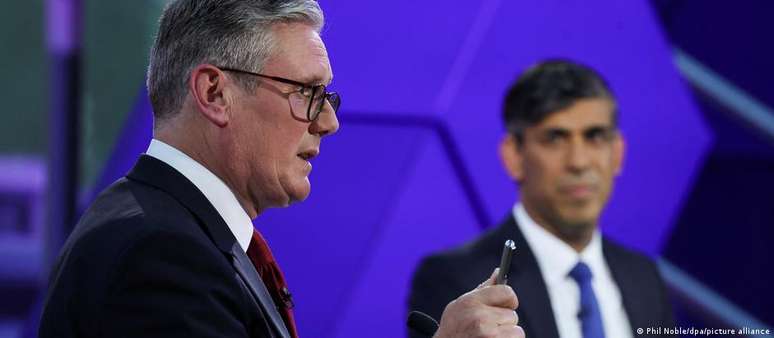The cost of living and the funding of public services are worrying voters in the United Kingdom and with a general election looming in the United Kingdom after 14 years, it is expected to return to power. Defeat of the ruling Conservative Party. After 14 years in opposition, Keir Starmer's Labor Party looks set to return to power with a huge majority.
Polls suggest frustration with the state of the economy is the main reason for the change. According to the US think tank Pew Research Centre, just 22% of voters think the UK economy is in good shape.
Even staunch Conservative Party supporters agree. Not long ago, in 2017, about 75% of the party's supporters had a positive view of the economy. Today that figure is 27%.
“Things are starting to get better”
This is not good news for a party that has had a decade and a half to implement its economic vision in the country. Still, the government has clung to some moderately positive economic data in recent months as a reason why voters still trust the Conservatives to manage the world's sixth-largest economy.
“After two difficult years, without a doubt, things are now starting to look up,” Prime Minister Sunak said in May. “Confidence is returning to the economy and the country.”
The UK economy emerged from recession in the first quarter of 2024, with better-than-expected growth of 0.7%. Inflation fell to the bank's 2% target for the first time in three years, reinforcing expectations that the country's central bank will cut interest rates during the British summer.
Andrew Goodwin, an analyst at Oxford Economics, says there are early signs of economic recovery. “In the context of the last couple of years, the economy is doing reasonably well,” he assesses. “There has been steady growth, although not at the pace you normally see in the early stages of a recovery.”
Voter concern
However, he says the details of economic policies were not a major topic of discussion during the election campaign. “Economic policies don't have much traction with voters, and parties are mainly focused on other issues,” he says. “Yet cost-of-living pressures and underfunding of public services are two key factors behind voters' willingness to change.”
Analyst Creon Butler, director of global economics and finance at the London think tank Chatham House, estimates that the state of the economy is motivating voters, particularly the issue of inflation. He also says that funding public services is the most important issue for voters.
“They can see the effects of the poor performance of the economy on the National Health Service (NHS) and a whole range of other services, from the police to local authorities, spending on roads and more,” the comments suggest.
“In other words, what the public is seeing is the consequences of poor economic performance, with the government not having enough money to spend on essential public services.”
A key issue for the next government is public investment. A recent study by the Institute for Fiscal Studies, a UK-based economic research firm, predicts that public sector investment as a percentage of GDP will decline to 1.8% by 2028 from an estimated 2.4% this year.
“I don't think the public is hearing the whole story from the political parties about the tough choices we have to make,” Butler says. “The consequences of the weakness of the economy, especially productivity growth, are not really explained to the public as much as needed,” he assesses.
Goodwin agrees. “The shape of post-election fiscal policy is debatable, but both parties largely ignore the bad legacies they face in the next government,” he says.
Some differences related to economic policy
Although there is a great deal of debate between the two sides, including how to increase productivity and GDP growth, many commentators say that the economic policies of Labor and the Conservatives are not very different.
Since the disastrous and short 49-day government of conservative Liz Truss, Labor has presented itself as the stable choice to manage the economy.
Truce's government collapsed due to his unorthodox economic policies. This destroyed the image of the Conservative Party as a party of economic efficiency. But since fellow Conservative Jeremy Hunt became UK Chancellor of the Exchequer, Labor has not opposed many of his economic positions.
Labour's Rachel Reeves, expected to be finance minister in a Labor government, shares Hunt's views on taxation and fiscal rules, two key aspects of public spending.
Even so, Butler believes a Labor government could lead to fundamental economic change after 14 years of Conservative governments. “It's important not to underestimate the fact that the overall approach is very different because the philosophy is different,” he notes.
He says Labor differs fundamentally from the Conservatives in three areas of economic policy: the role of the public sector, regulation and attitudes towards the EU.
The impact of a Labor government will be most quickly felt on relations with the EU. Although Labor leader Keir Starmer has avoided talking about Brexit since taking over the leadership, the Conservatives tried to portray Labour's victory as “bad for Brexit”.
“Brexit will be at risk from Labour,” Sunak recently summed up.
Butler says Labor has less “baggage” than the Conservatives on the EU and, for example, while they do not want to reopen negotiations to rejoin the customs union, they are keen to develop more cordial and productive ties with the EU. And the UK than in recent years.
However, he insists that whoever wins the elections, the long-term impact of leaving the EU will be huge. Many studies show that Britain's GDP today is 2% to 3% lower than it would have been had Brexit not happened.



